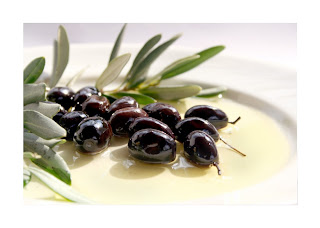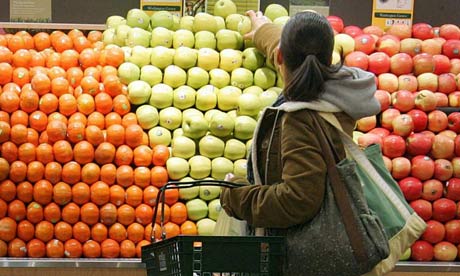Monday, March 16, 2009
Health Habits
Tuesday, March 10, 2009
Fat-- healthy?
- provide needed energy
- allow you to absorb vitamins A,D,E,K and prevent deficiencies in these vitamins
- helps food to stay in the stomach longer, giving a greater sense of satisfaction and preventing hunger soon after meals
- may help your body produce endorphins (the substances that make you feel good)
- provide flavor and texture to help prevent food from being bland and dry
- compose 60% of the brain and are essential to brain function, including learning abilities, memory retention and moods. Fats are especially important for pregnant women, since they are integral to fetal brain development.
But before you go out and start justifying the three Big Mac meal you just bought from McDonald's, you have to realize that like anything, some are just better than others. So which fats are the best? Here are some over views of fats from helpguide.org.
Trans
-Trans fats are created by heating liquid vegetable oils in the presence of hydrogen gas, a process called hydrogenation. Partially hydrogenating vegetable oils makes them more stable and less likely to spoil, which is very
 good for food manufacturers – and very bad for you.
good for food manufacturers – and very bad for you.-Primary sources of trans fat are vegetable shortenings, some margarines, crackers, candies, cookies, snack foods, fried foods, baked goods, and other processed foods made with partially hydrogenated vegetable oils.
-Trans fat raises low-density lipoprotein (LDL or "bad") cholesterol that increases your risk of coronary heart disease (CHD), as well as lowering HDL, or good cholesterol.
Saturated
-usually solid at room temperature and have a high melting point
-primary sources are animals including red meat and whole milk dairy products as well as tropical vegetable oils such as coconut, palm and foods made with these oils
-saturated fat raises low-density lipoprotein (LDL or "bad") cholesterol that increases your risk of coronary heart disease.
Un Saturated
- Monounsaturated
 -liquid at room temperature and turn cloudy when kept in refrigerator.
-liquid at room temperature and turn cloudy when kept in refrigerator.-primary sources: plant oils- like canola, peanut, and olive oil. Other good sources include
avocados, nuts, and seeds
-many who follow a traditional Mediterranean diet have foods high in monounsaturated
fat and tend to have lower risk of cardiovascular disease
- Polyunsaturated
-liquid at room temperature as well as at cold temperature
-primary sources are sunflower, corn, soybean, and flaxseed oils and also found in foods such as walnuts and fish.
-this fat family includes the Omega-3 group of fatty acids which your body can't make and are found in very few foods
Thursday, March 5, 2009
Breakfast and the rest of the meals

Some ideas/ways that we can remember to eat breakfast include:
• Start Small. If your not a breakfast eater, begin with whole wheat toast and/or a piece of fruit. In a few days, add more food.
• Choose Fruit for Breakfast. Fruit gives you fiber. Fresh fruit is the best choice. There are many to choose from: oranges, grapefruits, apples, bananas, grapes, kiwis, mangos, melons, berries. Eat two servings of fruit every morning. Canned fruit packed in juice is also a good choice. Add dried fruit to your cereal.
• Eat High Fiber Hot Cereal. Hot cereal is the best choice, but there are several brands of cold cereal on the market that are high in fiber and low in sugar. Oatmeal is a favorite hot cereal. Try a seven grain cereal and experiment with different grains such as millet, brown rice, quinoa, corn grits for a variety. Try cooking grains in a crock pot overnight and it’s already the next morning. Or cook up a large batch and re-heat the next day. Make your own granola. Add a high fiber cereal to your favorite low fiber cereal. Gradually increase the amount of the high fiber cereal and decrease the amount of the low fiber cereal. For example, if you like cornflakes, add Wheat Chex to the cornflakes. Each morning add a little more Wheat Chex and a little less Cornflakes.
• Choose Whole Grain Bread. Eat two slices of toast in the morning or a whole grain bagel. Spread with fruit spread or applesauce or your favorite nut butter.
• Make Healthy Pancakes or Waffles. Have you ever considered topping your pancakes or waffles with fruit?
• Instead of scramble eggs try scrambled tofu. You’re in for a great surprise.
• The sky’s the limit. The only limitation is your imagination. Make it a priority. Eat breakfast.
Sunday, March 1, 2009
I don't need to-- I exercise

Although some can still manage to have a slim physique because they run a lot, or have a "fast metabolism" that should be no excuse to not eat healthy. Nutrition isn't important just to look good, but to feel good and is a great way to compliment your exercise routine--in fact eating well should be even more incentive as you will probably need an increased intake of carbohydrates and protein.
About.com discusses ways that you can get this extra needed nutrition and outlines it by when normally do your work outs. For example, if you like to work out in the mornings it suggests that you try eating, bagels, raisins, bananas, or a liquid meal like a sports drink.

Other things to take into consideration are the extra hydration that you will need. The American College o
 f Sports Medicine (ACSM) suggests that when you work out you need more water and you need to drink around 16 oz of water two hours before your workout for optimum performance and sip water throughout your program.
f Sports Medicine (ACSM) suggests that when you work out you need more water and you need to drink around 16 oz of water two hours before your workout for optimum performance and sip water throughout your program.
Wednesday, February 11, 2009
It doesn't taste good
So how do you get kids, or even yourself, to eat healthy?
Snacks! Children get about 1/4 of their nutrition a day from snacks and instead of giving them sugar and fat filled treats, try making some delicious, yet nutritious fun snacks. Family Fun.com has a lot of great treat ideas, a couple of my favorites are:
ARCTIC ORANGES

4 oranges
4 cups orange juice
4 cherries
Cut the tops off the oranges in a zigzag pattern. Hollow out the insides, remove the seeds and combine in a blender with the juice. Set the rinds in a muffin tin and fill with the mixture. Drop a cherry inside each orange. Freeze for 2 to 3 hours. Soften the treats for 5 minutes, then serve. Makes 4.
Place a graham cracker in a plastic baggy, seal it shut and crush the crackers into a fine sand using a large spoon.
Add a few raisins to the bag and have the kids dig for bugs in the sand. Experiment with other tasty critters--dried cranberry "ladybugs," carob chip "ants" and fruit snack "worms."
Wednesday, January 14, 2009
It's Too Expensive

Everyone knows health food = expensive
"University of Washington researchers found when they compared the prices of 370 foods sold at supermarkets in the Seattle area. Calorie for calorie, junk foods not only cost less than fruits and vegetables, but junk food prices also are less likely to rise as a result of inflation."
When you can eat more calories for less money, especially when you are strapped for cash, why would you buy healthier foods? Possibly because of the way that a healthy lifestyle saves you in the long run, as your risk for obesity decreases and along with that your risk for chronic diseases drop as well.
This is a comforting fact considering chronic disease facts such as:
- The medical care costs of people with chronic diseases account for more than 75% of the nation’s $2 trillion medical care costs.
- The direct and indirect costs of diabetes is $174 billion a year.
- Each year, arthritis results in estimated medical care costs of nearly $81 billion, and estimated total costs (medical care and lost productivity) of $128 billion.
- The estimated direct and indirect costs associated with smoking exceed $193 billion annually.
- In 2008, the cost of heart disease and stroke in the U.S. is projected to be $448 billion.
- The estimated total costs of obesity was nearly $117 billion in 2000.
- Cancer costs the nation an estimated $89 billion annually in direct medical costs.
- Nearly $98.6 billion is spent on dental services each year.
There are lots of great ideas to help you reduce food costs without losing nutrition. Divine Caroline provides her list of 20 healthy food items for under $1, a deal you can't beat and with some items that aren't typical of the American diet, you can get creative with your cooking.
Rebecca Pratt also details some ways you can eat healthy on a budget, such as:
- Drink lots of water (at least 8 cups a day)
- Limit salty and sugary foods
- Avoid eating many foods that are high in saturated fats
- Make “variety” the watchword of your eating
- Set aside a regular block of time to plan your meals (include snacks)
- Stock up on healthy, but cheaper items-- such as beans, lentils, pastas, rice
- You can cook large quantities and then freeze extras
- Buy in bulk, but only things that make sense, vegetables or fruits that will go bad quickly are not the best bulk item
Now it's your turn, what are ways that you find to decrease the cost of your groceries without decreasing your health?
No Time
Another issue to address is: Are fast food restaurants really that bad for me?
If you have ever seen "Super Size Me" I'm sure your first knee-jerk reaction to this question would be an automatic "YES!" Consider the facts:
- most fast food restaurants fry a majority of their food and you can bet on almost anything from a fast food joint to have at least twice as many calories as something made at home
- serving sizes in fast food restaurants do not match up with suggested serving sizes from
- "Some scientists are starting to believe that binging on foods that are excessively high in fat and sugar can cause changes to your brain and body that make it hard to say no. A few even believe that the foods can trigger changes that are similar to full-blown addiction."(Martindale 2003)
